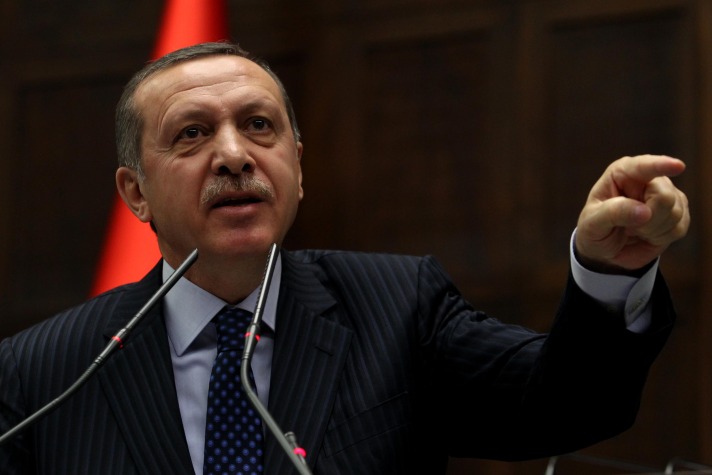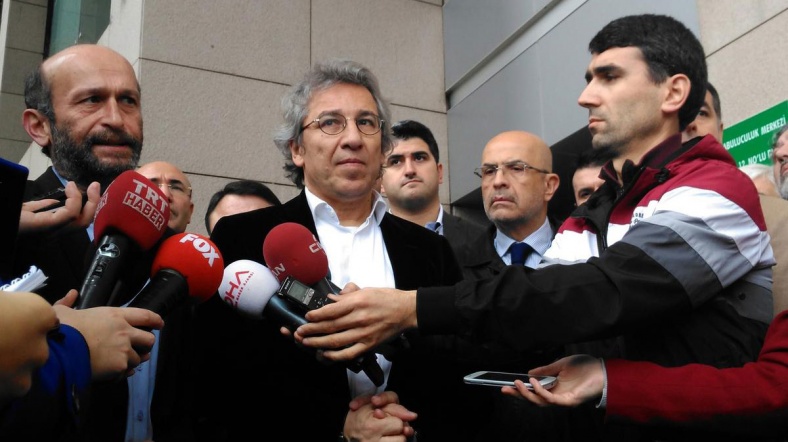Turkey: Parties agree to finalize “New Constitution” by first half 2012
Turkish Prime Minister Recep Tayyip ErdoğanTurkey’s ruling Justice and Development Party (AK Party) and main opposition Republican People’s Party (CHP) on Thursday agreed on how the new constitution will be prepared while Prime Minister Recep Tayyip Erdoğan revealed plans to replace the current Constitution with the new one by the first half of 2012. “We will concentrate on this issue [of making the new constitution] with the opening of Parliament [on Saturday]. We hope to be done with this issue in the first half of 2012,” Erdoğan said on Thursday as he responded to questions from reporters at Ankara’s Esenboğa Airport before he left the country for an official visit to Macedonia.
Turkey’s long-awaited expectations for a new civilian constitution have become stronger than ever since the June 12 parliamentary elections. All of the parties represented in Parliament vowed to draft a new constitution to replace the existing one, which was drafted under martial law after the Sept. 12, 1980 military coup and has long been criticized for failing to respond to today’s needs for broader rights and freedoms. The ruling party also vowed to make a new constitution after its election victory based on a broad consensus in the Parliament.
As part of its efforts to prepare the new constitution in cooperation with the political parties and the civil society, a delegation from the AK Party visited the CHP on Thursday in a bid to draw a roadmap for the preparations of the new constitution, and the two parties reached an agreement on the method of how to prepare it. The AK Party delegation is led by the party’s deputy chairman, Ömer Çelik, and includes Deputy Prime Minister Beşir Atalay, Justice Minister Sadullah Ergin, AK Party Ankara deputy Ahmet İyimaya and Parliamentary Constitutional Commission Head Burhan Kuzu. The delegation met with a group of CHP officials, which included CHP Deputy Chairman Atilla Emek, CHP Secretary-General Bihlun Tamaylıgil, CHP parliamentary group Deputy Chairman Akif Hamzaçebi and CHP Party Council member Süheyl Batum at the CHP headquarters in Ankara.
Speaking to reporters after the meeting, Çelik said the two parties had reached an agreement that a reconciliation commission led by Parliament Speaker Cemil Çiçek should conduct the preparations for the new constitution and that the number one item on the agenda for Parliament in the new term should be the new constitution. Çelik underlined that opinions on the content of the new constitution were not discussed during the meeting as it will be the task of the Constitutional Reconciliation Commission to discuss the content of the new charter.
CHP’s Hamzaçebi pointed out the necessity of drafting the new constitution with a broad consensus, noting that having strong public support behind it will make the legitimacy of the new constitution unquestionable.
“Constitutions are texts of social contracts. They should be texts on which the society has the broadest consensus,” he said.
In the first round of talks with political parties on the new constitution, the AK Party met with the opposition Nationalist Movement Party (MHP) to exchange views on the constitution-making process on Wednesday. The meeting was deemed a positive one by the ruling party.
Professor Serap Yazıcı, an expert on constitutional law said she finds the agreement between the AK Party and the CHP and the willingness of other political parties to give members to the Reconciliation Commission a very positive development while acknowledging that the preparation of the new constitution will be a challenging process.
“The Reconciliation Commission will first decide on the method regarding the preparation of the new constitution and it will then begin to discuss the content of it. The political parties in Turkey have very different approaches regarding the major problems of the country. For instance, the MHP may not accept the [pro-Kurdish Peace and Democracy Party] BDP’s excessive demands [to be included in the new constitution]. The political parties need to act with self-sacrifice in this process,” Yazıcı told Today’s Zaman.
Regarding Erdoğan’s remarks about finishing the new constitution by the end of the first half of 2012, Yazıcı said although the process is just at the start, it is very pleasing to see the prime minister make such determined statements on the preparation of the new constitution.
Prime Minister Erdoğan, who on Thursday also commented on the decision of the pro-Kurdish Peace and Democracy Party (BDP) to end its parliamentary boycott and to join in with parliamentary proceedings, said the party can take part in talks on the drafting of the new constitution as long as they form a parliamentary group. Noting that the government had initially requested appointments with the parties that have parliamentary groups in Parliament, he added they can also meet with the BDP if they form a group.
The BDP refused to take the oath in Parliament and join in with parliamentary proceedings in protest of the imprisonment of six of its deputies. Thirty-six independent deputies supported by the pro-Kurdish BDP were elected in the June 12 elections. However, six of them are currently under arrest as part of the Kurdish Communities’ Union (KCK) trial. The BDP made the decision to boycott Parliament after the Supreme Election Board (YSK) stripped Hatip Dicle, one of the six jailed BDP deputies, of his mandate because of a prior terrorism-related conviction after the June 12 vote. On Wednesday, the party announced its decision to end its boycott of Parliament.
The latest developments, which have raised hopes about the preparation of the new constitution, were also interpreted as a good sign by renowned constitutional law professor, Ergun Özbudun, who at the same time acknowledged the difficulty of the process.
Özbudun said by the political parties having some red lines on the issues that polarize the country and having different approaches toward the issues such as the Kurdish problem, freedom of faith and expression as well as military-civilian relations, show the difficulty of achieving a broad consensus on the new constitution.
Regarding the prospects of the making of the new constitution by the end of the first half of 2012, he said the new constitution should be prepared within a reasonable period of time and it should be done by the end of 2012 at the latest, or else, the parties will lose their concentration on it and begin spending their energy on preparing for the upcoming general elections.
29 September 2011
SOURCE: TODAYS ZAMAN




